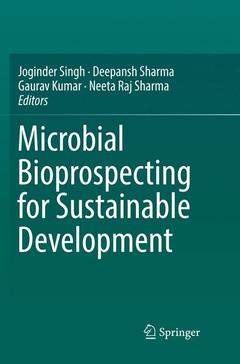Description
Microbial Bioprospecting for Sustainable Development, Softcover reprint of the original 1st ed. 2018
Coordinators: Singh Joginder, Sharma Deepansh, Kumar Gaurav, Sharma Neeta Raj
Language: English
Subjects for Microbial Bioprospecting for Sustainable Development:
Publication date: 01-2019
Support: Print on demand
Publication date: 10-2018
Support: Print on demand
Description
/li>Contents
/li>Biography
/li>Comment
/li>
This book presents a comprehensive overview of the use of microorganisms and microbial metabolites as a future sustainable basis of agricultural, environmental and industrial developments. It provides a holistic approach to the latest advances in the utilization of various microorganism bioprospecting including their wide range of applications, traditional uses, modern practices, and designing strategies to harness their potential. In addition, it highlights advanced microbial bioremediation approaches, including genetic manipulation, metagenomics analysis and bacteriophage-based sensors for the detection of food-borne pathogens. Lastly, it elaborates on the latest advances regarding the role of microbes in the sustainable development of various industrial products.
Chapter 1. Introduction.- Chapter 2. Microorganisms for sustainable agriculture and environmental applications.- Chapter 2.1. Small at Size, Big at Impact: The Microbial Way of Life.- Chapter 2.2. Bioherbicidal Concept: A Novel Strategy to Control Weeds.- Chapter 2.3. Endophytic microorganisms as Bio-Inoculants for Sustainable Agriculture- Chapter 2.4. Exploitation of fungal pathogens for weed management in sustainable agriculture.- Chapter 2.5. Endophytes: Golden treasure for enzyme inhibitors Isothiocyanate.- Chapter 2.6. Microbial Bioremediation. - Chapter 2.7. Impact assessment of environmental pollutants and role of white rot fungus as bioremediation for sustainable agriculture.- Chapter 2.8. Arsenic Contamination in Water and its Management.- Chapter 2.9. Bioremediation of Industrial Waste Water for the Sustainable Environment.- Chapter 2.10. Myxobacteria: Unearthing the Potential through Research.- Chapter 3. Microorganisms for sustainable industrial important products.- Chapter 3.1. Microbial Exopolysaccharides: Multifunctional Roles in Food Technology.- Chapter 3.2. Microbial Cellulases: Role in Ethanol production.- Chapter 3.3. Antimalarial potential of Actinobacteria.- Chapter 3.4. Application of bacterial polysaccharides in cosmetic industries.- Chapter 3.5. Industrially important soil fungal enzymes and pigments for the sustainable development.- Chapter 3.6. Microbes in metabolite production: Current potential and strategies. - Chapter 3.7. Bioprospecting of yeast cell using metagenomics for efficient biofuel production.- Chapter 4. Microorganisms as future tools.- Chapter 4.1. Microbial spores: Concepts and Industrial applications.- Chapter 4.2. Engineering the microbes: Genetic manipulations and their applications.- Chapter 4.3. Riboswitches as molecular tools for regulating microbial gene expression.- Chapter 4.4. Microbial Metagenomics for Industrial and Environmental Bio-prospecting: The Unknown Envoy.- Chapter 4.5. Bacteriophage based biosensors for the detection of food borne pathogens.- Chapter 4.6.Biosensors: State-of-the-Art Tools for Detection of Food Borne Pathogens.
Dr. Joginder Singh Panwar is presently working as an Associate Professor at the School of Bioengineering and Biosciences, Lovely Professional University, Punjab, India. Previously, he worked as a Young Scientist at the Microbial Biotechnology and Biofertilizer Laboratory, Department of Botany, Jai Narain Vyas University, Jodhpur for the Department of Science and Technology, Govt. of India. His research interests include the exploration of efficient strategies for the bioremediation and phytoremediation of pollutants from water and soil. Presently, his research activities are directed towards designing and developing cleanup technologies (biofilters) for the in-situ bioremediation of textile industrial effluents. He is an active member of various scientific societies and organizations including the Association of Microbiologists of India, Indian Society of Salinity Research Scientists, Indian Society for Radiation Biology, and European Federation of Biotechnology. He has published more than 60 research and review articles in peer-reviewed journals, 2 edited books and 10 book chapters.
Dr. Deepansh Sharma is an Assistant Professor of Microbiology at Amity Institute of Microbial Technology, Amity University, Rajasthan. He began his academic career as an Assistant Professor (Microbiology) at the School of Bioengineering and Biosciences, Lovely Professional University, Punjab, India. He has extensive teaching experience in the fields of Fermentation Technology, Food Microbiology, Industrial Microbiology and Microbial Technology. Previously, he was selected for a short- term scholarship (DAAD, Germany, 2012) to work as an international visiting researcher at Karlsruhe Institute of Technology, Germany. Furthermore, he is an active member of many scientific societies and organizations, including the Association of Microbiologists of India, American Society of Microbiology, European Federation of Biotechnology,
Easy informative illustrations of recent trends in microbial technology
Start with basic cell behavior and elaborate the advanced prospective of the latest findings
Elaborated and expressive tables and figures with concise information
Suggest future research avenues in the field of microbial sustainability
Recent applications and exploration of microbial solutions to achieve environmental sustainability




